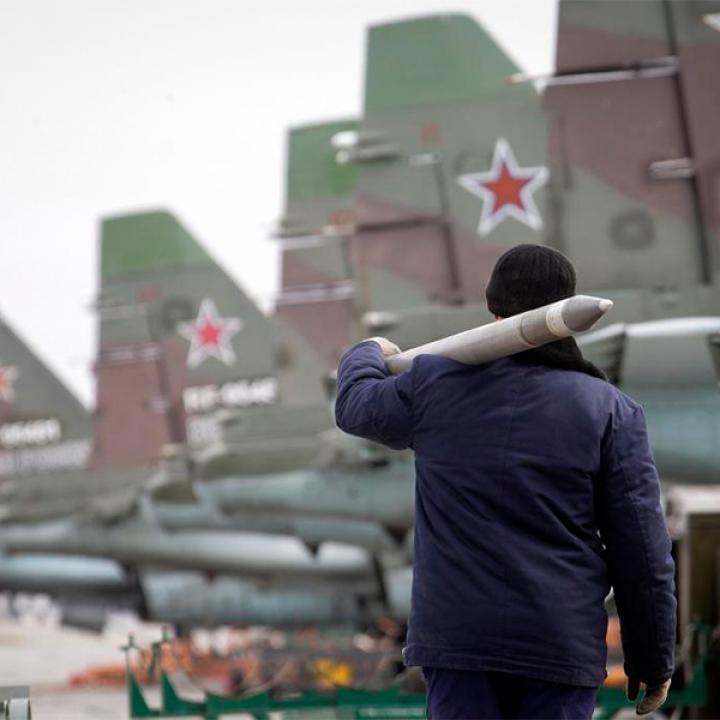
- Policy Analysis
- Articles & Op-Eds
Russia's Grim Pattern in Syria

Once again, Moscow has expressed agreement with the United States on the broad principles for easing the Syrian conflict and then acted without regard to those principles.
Syria's humanitarian catastrophe has grown to hundreds of thousands dead and 11 million people displaced. If the agreement reached in Munich provides a cessation of hostilities and creates humanitarian corridors, it would be worth it. But it is hard to be optimistic.
That is not because Bashar al-Assad says he will continue to go after terrorists, a category into which he conveniently lumps nearly all his opponents. What Mr. Assad says is largely irrelevant. His forces can do little without Russia and the Iranian-backed Shiite militias -- and even the Iranian-backed forces are increasingly dependent on the Russians for air cover and artillery support.
It is the Russians who matter, and they have once again engaged in their pattern of agreeing with us on the broad principles for easing the Syrian conflict and then acting without regard to those principles. Since 2012 Russia has agreed to principles that included the idea of a transition in Syria but has never deviated from its support and materiel backing of Mr. Assad. Moreover, Russia continued to back him unconditionally when he refused to budge on any issue in the brief talks with opposition groups in December 2013 and January 2014 in Geneva. This past November an agreement was reached on the Vienna principles that called for an 18-month transition period to be initiated by negotiations and a cease-fire with modalities to be worked out quickly. These points were embodied in UN Security Council Resolution 2254 in December. And how did the Russians behave? Did they help get a cease-fire under way? Did they come to us and say that they would do their part to stop Mr. Assad's barrel bombs and end his use of starvation as a tool in the war if we lean on the Turks, the Saudis, and the Qataris to pressure opposition forces to stop fighting?
No, the Russians upped the ante of their own bombing and backed the regime/Iranian offensives in Daraa, in the Latakia mountains, and in the north around Aleppo. And if the Russians were serious about the Munich agreement, why would they be pounding the non-Islamic State, mostly non-Nusra Front targets now in order to cut off Aleppo? Clearly, those actions are not just to alter the balance of power on the ground but also to depopulate areas and largely reframe the future choices in Syria. Ironically, Vladimir Putin, Bashar Assad and ISIS all want to frame the choice as one between either the regime or Islamic State. For Mr. Putin, that choice ensures that the world backs Mr. Assad -- and Russia shapes the outcome it wants in a way that leaves no doubt that the Russians are the winner. For ISIS, the polarization makes its extremists the protectors of the Sunnis and draws Muslims internationally to their group.
I hope that I am wrong about Mr. Putin's aims. But every time the U.S. talks with the Russians, they bomb more. President Barack Obama spoke with Mr. Putin on Saturday to press for implementation of the Munich deal, and Mr. Putin's response was: No diminution of Russian airstrikes. This weekend, those strikes included the bombing of at least one Doctors Without Borders hospital. I am not suggesting that the U.S. stop talking with the Russians. But Mr. Putin is not impressed by words alone. He responds to leverage. If the U.S. is not prepared to raise the costs to the Russians by letting them know that they have left Washington no choice but to produce a safe haven and/or increasingly to arm Syrian opposition groups, then we can expect more of the same. And the definition of insanity is doing the same thing over and over again while expecting a different result.
Dennis Ross is the counselor and William Davidson Distinguished Fellow at The Washington Institute, and author of the book Doomed to Succeed: The U.S.-Israel Relationship from Truman to Obama. This article originally appeared on the Wall Street Journal blog "Think Tank."
Wall Street Journal



